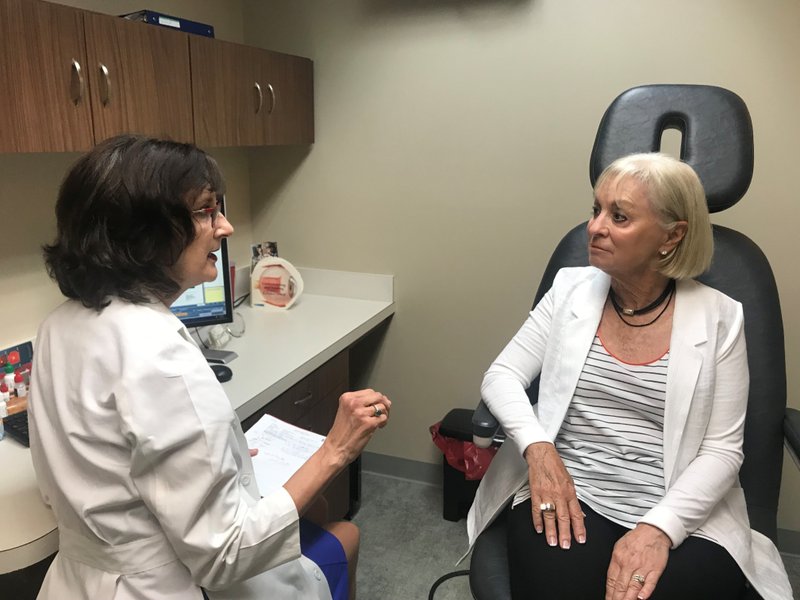The Safe Surgery Arkansas committee has asked the Arkansas Supreme Court to order Secretary of State John Thurston to certify the committee's petition to place on the 2020 general election ballot a proposed referendum of a 2019 law that allows optometrists to conduct a broader range of eye surgeries.
The committee and its chairwoman, Dr. Laurie Barber, filed the petition for a writ of mandamus late Tuesday afternoon.
The action came nearly two weeks after Thurston's office concluded Aug. 2 that the committee failed to submit enough valid signatures of registered voters to qualify the proposal for the eye surgery law -- Act 579 of 2019 -- for the Nov. 3, 2020, ballot.
Thurston's office said the committee's petition needed 53,491 signatures, but had only 23,953. Committee officials reported that they turned in more than 84,000 signatures to the secretary of state's office on July 23.
In its request to the Supreme Court, the Safe Surgery Arkansas committee challenged the Republican secretary of state's decision to apply another law, Act 376 of 2019, "disenfranchising 61,065 legal voters who petitioned the Secretary to certify a referendum petition to the November 2020 ballot." Act 376 of 2019 adds a new filing requirement for canvassers, the Safe Surgery Arkansas committee said.
Thurston disregarded at least 61,065 signatures because they were collected by canvassers who were "not registered" with the secretary of state's office, the committee learned in a request made under the Arkansas Freedom of Information Act, according to the Safe Surgery Arkansas committee.
Thurston used the term "not registered" to refer to the absence of a canvasser's sworn statement on file with his office at the time the signatures were obtained, the committee said in its petition filed by Little Rock attorneys Alex Gray, Nate Steel, A.J.Kelly and Ryan Owsley. Kelly worked under Thurston's predecessor, Mark Martin, a Republican.
The committee also said Attorney General Leslie Rutledge took the position after Act 376 passed that it removed her obligation to review and consider certifying the popular name and the ballot title of a proposed measure and shifted that duty to the state Board of Election Commissioners.
"Because no reasonable person would think Act 376's emergency clause [to make the law effective in March rather than July 24] states a genuine emergency, the clause fails, and the Act's provisions should not have been applied to the [Safe Surgery Arkansas committee's petitions]," according to the committee.
"Therefore, Petitioners have a clear and certain right that the more than 60,000 culled signatures be counted and the proposed measure be certified to the ballot," the committee said in its filing.
By establishing a functional licensing scheme, the prefiling requirement violates canvassers' and sponsors' political speech rights under Article 2, Sections 4 and 6, of the Arkansas Constitution, the Safe Surgery Arkansas committee said.
The committee asked the state's high court to issue a writ of mandamus to Thurston declaring that the 61,065 signatures must be counted, that the referendum's popular name and ballot title are sufficient and that the petition is sufficient to be placed on the ballot. The committee wants the court to order Thurston to certify the petition to the ballot.
Vicki Farmer, chairwoman of the Arkansans for Healthy Eyes committee that supports the eye-surgery law, said Wednesday that "we are confident in the Secretary of State's application of the law and rejection of the petition, which included tens of thousands of unlawfully solicited signatures.
"We think the Court will affirm the Secretary of State's action. Meanwhile, we are excited for Arkansans to enjoy better access to eye care, as the state works to implement Act 579," Farmer said in a written statement.
Chris Powell, a spokesman for Thurston, declined to comment about the appeal.
Officials for Safe Surgery Arkansas and Arkansans for Healthy Eyes have disagreed about whether the filing of petitions on July 23 with the secretary of state's office suspended Act 579 from taking effect on July 24.
Act 579 will allow optometrists to administer injections around the eye, remove bumps and lesions from the eyelids, and perform certain types of laser surgery now performed by ophthalmologists -- specifically capsulotomy, a surgery performed after cataract surgery, and trabeculoplasty, a procedure to reduce pressure from glaucoma. Optometrists are still banned from doing cataract surgery and radial keratotomy surgery and selling prescription drugs.
The law also requires the state Board of Optometry to establish credentialing requirements for a license to administer or perform these procedures. It also requires each optometrist who meets the requirements for certification of authorized laser procedures to report to the board regarding the outcome of the procedures and to also report to the state Board of Health.
During this year's regular legislative session, supporters of Act 579 said it would allow optometrists to use more of their training and would provide easier access to eye care for patients in rural areas. But the law's opponents, including groups representing ophthalmologists and other physicians, argued that it would put patients at risk.
Metro on 08/15/2019

